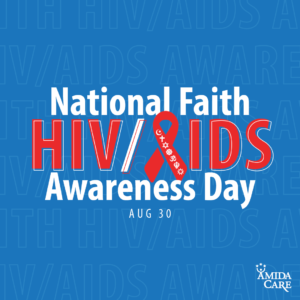Coming Together to End Stigma and Discrimination

National Faith HIV/AIDS Awareness Day
Faith plays a major role in the lives of many people who find in their practice a valuable connection to a spiritual being, deity, or creator. Many Americans have received crucial support from faith-based providers, including HIV testing, counseling, and linkage to health care, as well as basic necessities like food and housing. Public health programs have often partnered with religious communities to achieve improved health outcomes for people living with HIV. Yet faith communities can sometimes turn from a place of refuge to a source of stigma and turmoil for people living with HIV.
Sunday, August 30, is National Faith HIV/AIDS Awareness Day (NFHAAD), an observance intended to engage faith communities to work together for HIV/AIDS education, prevention, treatment, care and support, and to reduce and eliminate stigma and discrimination. (See below for virtual events in observance of the day.)
The National Black Leadership Commission on Health and RAHMA are among several organizations that partnered to launch the first Faith HIV/AIDS Awareness Day in 2017. Since then the initiative has reached over 200,000 people representing Muslim, Christian, Jewish, Buddhist, Sikh, Hindu, and Baha’i and other faith traditions across the U.S., encouraging them to take a stand against stigma and raise awareness about HIV.
This year, NFHAAD officially became recognized as an Awareness Day on HIV.gov (the website managed by the U.S. Department of Health & Human Services and supported by the Minority HIV/AIDS Fund). While this is a significant milestone, there is still much work to be done.
Get Involved
There are several virtual events planned in observance of NFHAAD, beginning with an opening ceremony on August 27. There will be events focused on Muslims and HIV; Muslim, Buddhist, Christian and Jewish prayer services; a spoken word performance focused on HIV, faith, and healing; and a virtual Town Hall about getting out the vote. See the full schedule here.
You are also invited to host your own online event with your own friends, family, and communities. Use #NFHAAD for the chance to be highlighted on RAHMA’s Facebook, Twitter or Instagram.
Help celebrate NFHAAD this year by joining an online event and by spreading the word among your friends, family, and community: Faith communities are crucial to ending HIV stigma and discrimination, and to ending the epidemic.
Resources
National Faith HIV/AIDS Awareness Day
HIV.gov
United Church of Christ HIV and AIDS Ministries
Evangelical Lutheran Church in America HIV and AIDS Ministry
Faith HIV/AIDS Awareness Day Facebook page
